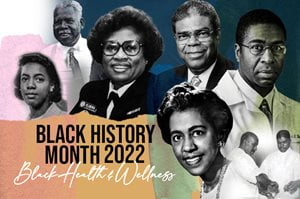Wednesday, Feb 02, 2022
By Dean Scott Ryan
School of Social Work

This year’s theme for Black History Month is “Black Health and Wellness.”
In announcing this theme, the Association for the Study of African American Life and History, the organization founded by the father of Black History Month, Dr. Carter G. Woodson, acknowledges that, for more than a century, Black people have been concerned about health and wellness - and challenges to attaining it.
How do we know Black people have been concerned about health and wellness?
The Association points to several ways we know this to be the case: 1) Dr. Daniel Hale Williams’ construction of the nation’s first medical facility to serve Black patients, Provident Hospital in Chicago in 1891; 2) the founding of historically Black Morehouse School of Medicine in 1867, 3) the establishment of Howard University College of Medicine in 1868, and 4) the start of Meharry Medical College in 1876.
The Association also notes that after the turn of the 19th century, there was grassroots organizing for community clinics and mutual aid societies across the nation as testimony that Black people have always cared about their health and wellness.
Each of these institutions, the association writes, was born of a central need and a specific purpose: To provide Black Americans with spaces to “counter the economic and health disparities and discrimination that are found at mainstream institutions.”
“These disparities (along with) anti-Blackness led to communities developing phrases such as ‘When white folks catch a cold, Black folks get pneumonia’,” the association writes, explaining a need for its 2022 theme.
In plain language, when issues affecting White people arise, Black people often disproportionately suffer the resulting effects, whether that be inflation resulting in job losses or a pandemic resulting in disproportionate hospitalizations and deaths.
This year’s theme also pays homage to the myriad ways African Americans draw on ancestral rituals and activities to become well, both physically and emotionally.
“At this point in the 21st Century, our understanding of Black health and wellness is broader and more nuanced than ever,” the association’s leadership wrote in its 2022 executive summary addressing this year’s theme. Some examples of contemporary ways that African Americans are dealing with emotional and mental health include initiatives such as Therapy for Black Girls and The Read, a weekly podcast with millions of listeners, which regularly features conversations about mental health and seeking therapy.
Dr. Marvin Dulaney, a former associate professor at the University of Texas at Arlington and the association’s new national president, said the theme Black Health and Wellness not only encourages a review of the history of healthcare among African American people in this nation, but it also suggests that academics, researchers and others conduct a “historical examination of the financial and economic health and wellness of African Americans.”
“Broadening and expanding the theme to address what some historians and health care professionals call the ‘social and economic determinants’ of health and wellness allows us to show the interconnectedness of a number of historical, social and economic factors on Black Health and Wellness,” said Dr. Dulaney, who formerly served as chair of UTA’s Department of History and also as interim director of the UTA Center for African American Studies.
For sure, health disparities are not new. The US Department of Health and Human Services has identified goals to eliminate racial disproportionalities in outcomes in heart disease, stroke, cancer, HIV, AIDS, diabetes, mental health and other areas since 2001.
Still, there’s simply many other health areas where much work is needed, says Dr. Robert H. Keefe in his 2010 paper Health Disparities: A Primer for Public Health Social Workers.
“Public health Social Workers, researchers and health policy analysts will continue to be called upon to help eliminate the ongoing disparities so that all Americans have access to needed healthcare,” Dr. Keefe wrote.
This Black History Month, our hope is that emerging Social Workers will educate themselves on disparities limiting optimal Black health and wellness and will commit themselves to addressing these inequities through policy changes, community education and research.
This must begin first with listening to Black people and believing what they say about their health.
In solidarity,

Scott D. Ryan
Dean and Professor
School of Social Work
The University of Texas at Arlington
** Statement supported by the School of Social Work’s Diversity, Equity and Inclusion Office and the Communications and Community Outreach Office.

